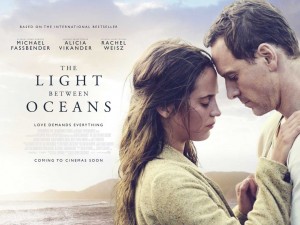Susan Granger’s review of “The Light Between Oceans” (DreamWorks)
If you’re in the mood for an old-fashioned, historical melodrama, this should be your choice.
Returning from W.W. I in 1919, embittered Tom Sherbourne (Michael Fassbender) takes a job manning a lighthouse on an isolated, windswept island called Janus, off the coast of Western Australia. A taciturn fellow of few words, he wants to escape from the carnage of civilization and be left in solitude.
En route to assume his post, he meets Isabel Graysmark (Alicia Vikander), who lives in the nearest coastal village. A romance via mail ensues, they get married and Isabel subsequently suffers two devastating miscarriages.
Then a dinghy containing a crying baby girl and the dead body of a man washes up on their beach. Dutiful Tom’s first instinct is to report the incident immediately and hope that he and Isabel can adopt the infant.
But desperate Isabel persuades him to keep his silence, convincing him that no agency would allow them to adopt a child to live on rugged, remote Janus Rock with no school, no medical care and no church. Her plan is raise the child as their own in their seaside cottage.
Complications occur at the child’s christening on the mainland, where stoic Tom spies Hannah (Rachel Weisz), mourning at the grave of her husband and baby who disappeared at sea just when the dinghy washed ashore.
Riddled with guilt, Tom slips an anonymous note to Hannah, assuring her that her daughter is alive and well. That prompts a police investigation and bitter child-custody struggle.
Adapted from M.L. Sherbourne’s 2012 novel, it’s written and directed by Derek Cianfrance (“Blue Valentine,” “The Place Beyond the Pines”). Obviously contrived and emotionally manipulative, its inherent ethical dilemma generates real empathy, since all the characters must make incredible sacrifices and, ultimately, learn forgiveness.
Couple that with the unrelenting chemistry between Fassbinder and Vikander, amplified by Alexandre Desplat’s lyrical score and Adam Arkapaw’s evocative cinematography.
On the Granger Movie Gauge of 1 to 10, “The Light Between Oceans” shines with a schmaltzy 7, a sorrowful, heart-wrenching “weeper.”

